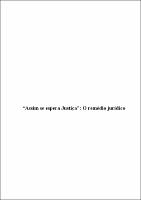Please use this identifier to cite or link to this item:
http://rima110.im.ufrrj.br:8080/jspui/handle/20.500.14407/10055| Tipo do documento: | Tese |
| Title: | “Assim se espera Justiça”: o remédio jurídico do habeas corpus no Supremo Tribunal Federal, 1920-1929. |
| Other Titles: | "Thus We Expect Justice": Habeas corpus as legal remedy in the Federal Supreme Court of Brazil, 1920-1929. |
| Authors: | Castro, Tatiana de Souza |
| Orientador(a): | Sá Pinto, Surama Conde |
| Primeiro coorientador: | Caulfield, Sueann |
| Primeiro membro da banca: | Sá Pinto, Surama Conde |
| Segundo membro da banca: | Magalhães, Felipe Santos |
| Terceiro membro da banca: | Basile, Marcello Otávio Neri de Campos |
| Quarto membro da banca: | Ribeiro, Gladys Sabina |
| Quinto membro da banca: | Koerner, Andrei |
| Keywords: | Judiciário;habeas corpus;cidadania;Primeira República;Judiciary;habeas corpus;citizenship;First Republic |
| Área(s) do CNPq: | Ciências Humanas |
| Idioma: | por |
| Issue Date: | 29-May-2018 |
| Publisher: | Universidade Federal Rural do Rio de Janeiro |
| Sigla da instituição: | UFRRJ |
| Departamento: | Instituto de Ciências Humanas e Sociais |
| Programa: | Programa de Pós-Graduação em História |
| Citation: | CASTRO, Tatiana de Souza. “Assim se espera Justiça”: o remédio jurídico do habeas corpus no Supremo Tribunal Federal, 1920-1929. 2018. 352 f. Tese (Doutorado em História) Instituto de Ciências Humanas e Sociais, Departamento de História, Universidade Federal Rural do Rio de Janeiro, Seropédica, RJ, 2018. |
| Abstract: | Este estudo tem como objetivo contribuir para a discussão sobre o processo de construção e o exercício da cidadania na Primeira República, através da análise da relação entre a população carioca e o Estado, bem como do exame das formas de manifestação e questionamento do que essa população entendia serem direitos adquiridos, utilizando como cenário a cidade do Rio de Janeiro, na década de 1920. Nossa proposta é analisar o exercício da cidadania em meio ao modelo político excludente daquela época, considerando que mesmo diante dessa realidade, havia canais de reivindicação para essa população, nos quais práticas de questionamento e demandas feitas ao Estado eram observadas. O Judiciário pode ser tomado como exemplo nesse sentido e será nosso espaço de análise. Trabalhamos com processos de habeas corpus originários do Supremo Tribunal Federal que se encontram no Arquivo do Supremo Tribunal Federal em Brasília e no Arquivo Nacional na cidade do Rio de Janeiro. Ao longo da Primeira República o habeas corpus foi considerado como "o grande remédio" para os problemas vivenciados pelos cidadãos, tendo em vista que este era o único instrumento jurídico que protegia a liberdade individual naquela época. Esses processos nos permitem vislumbrar a demanda por direitos desses cidadãos na Justiça, demonstrando que ela era considerada por eles como um espaço no qual poderiam reaver o que julgavam como sendo seus direitos. Visamos verificar se o Judiciário, por meio do remédio do habeas corpus, foi um espaço para o exercício de cidadania. Nossa hipótese central é a de que o Judiciário foi visto por setores da sociedade como espaço de defesa do que consideravam direitos de cidadania, mas na prática, no exame do instituto do habeas corpus, o STF não foi uma instância que contribuiu para a garantia de tais direitos, já que o STF apresentava um modus operandi que dificultava a concessão dos pedidos de habeas corpus. |
| Abstract: | This study contributes to debates on the process of constructing and exercising citizenship in the First Republic of Brazil through an analysis of the relationship between Rio de Janeiro's population and the federal government, as well as an examination of the ways the population of Rio de Janeiro in the 1920s manifested and contested their acquired rights. It analyzes the exercise of citizenship within the exclusionary political model of the time, considering the extent to which Rio‟s citizens claimed their constitutional rights through the federal judiciary. The study works with habeas corpus cases originating from the Federal Supreme Court, located in the Federal Supreme Court Archive in Brasília and in the National Archive in the city of Rio de Janeiro. Throughout the First Republic, habeas corpus was considered "the great remedy" for the problems citizens faced, since it was the only legal instrument that protected individual freedom at that time. These cases demonstrate that many of Rio‟s citizens considered the judiciary to be a space in which they could recover what they considered their rights. However, the examination of the habeas corpus petitions brought to the Federal Supreme Court of Brazil suggests that the Supreme Court did not, in fact, contribute to the guarantee of such rights, since the Federal Supreme Court of Brazil had a modus operandi which made it difficult to concede the requests for habeas corpus. |
| URI: | https://rima.ufrrj.br/jspui/handle/20.500.14407/10055 |
| Appears in Collections: | Doutorado em História |
Se for cadastrado no RIMA, poderá receber informações por email.
Se ainda não tem uma conta, cadastre-se aqui!
Files in This Item:
| File | Description | Size | Format | |
|---|---|---|---|---|
| 2018 - Tatiana de Souza Castro.pdf | 2018 - Tatiana de Souza Castro | 5.31 MB | Adobe PDF |  View/Open |
Items in DSpace are protected by copyright, with all rights reserved, unless otherwise indicated.

